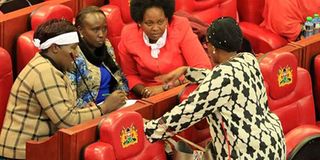Reflections on a more gender equal society

MPs during debate on the gender bill on November 21, 2018. PHOTO | FILE | NATION MEDIA GROUP
What you need to know:
- The share of parliamentary seats occupied by women has doubled since 2012, from 9.8 per cent to 22 per cent.
- Women and girls shoulder a disproportionate domestic care burden and have difficulties travelling due to safety concerns.
Although Kenya has made significant strides to promote gender equality and the empowerment of women and girls in various aspects of public and private life, there is still much to do.
Girls are still less likely to transition to and complete tertiary education than boys. Only 3 per cent go to university as per studies by the Dalberg Group, which has helped more than 15 million children in Africa and Asia, especially girls, develop literacy skills over five years.
Kenya’s progressive 2010 Constitution introduced new gender equality legislation that supersedes customary laws on issues such as resource ownership and court representation.
The share of parliamentary seats occupied by women has doubled since 2012, from 9.8 per cent to 22 per cent. Compulsory free education has helped boost female enrolment in schools by 39 per cent in the last 15 years. Girls and boys now have near-equal access to primary and secondary schooling.
Free health services for pregnant women have boosted the share of births attended to by health professionals, leading to a 33 per cent decline in maternal mortality. And, two-thirds of women have access to modern contraceptives.
UNIVERSITY DEGREE
But our research shows although a university degree can help increase family incomes fivefold, many girls drop out of tertiary education because they can’t afford it or because they have children. The chance of a 20-year-old woman in Kenya becoming a single mother is still close to 20 per cent (though the number is declining).
So how do we address this? The typical approach of providing equal access to education and healthcare, while laudable, is not enough. In addition to challenges on these fronts, girls and women face a host of social and cultural barriers that prevent them from realising their potential.
Women and girls shoulder a disproportionate domestic care burden and have difficulties travelling due to safety concerns.
They also suffer psychological and physical damage from gender-based violence and enjoy limited decision-making power in patriarchal families and communities.
Imagine getting a job offer that requires regular night shifts, but having no safe way to commute; imagine having access to training on better farm management, but only at the time you are expected to cook at home; imagine receiving a university scholarship but having no clear role models to help navigate the difficult balance between academic, professional and familial responsibilities.
CREATING FORUMS
Building blocks for a more gender-equal society are captured in a report we recently published in partnership with Standard Chartered Bank titled: Girls’ Economic Empowerment In Africa and Asia What it Takes, What’s Working, and What Still Needs to Be Done.
They include: Creating forums for partnership and coordinated action to tackle multiple gender-related issues. Providing more grants, investment funding and better access to finance for small-scale grass roots organisations and female entrepreneurs. Engaging gatekeepers in gender empowerment initiatives to reach women and girls more effectively.
Boys, men and older women with significant influence can play an important role in decisions, welfare, self-respect and confidence of women and girls among others.
Naoko Koyama is a Partner at Dalberg Nairobi. E-mail: [email protected]




